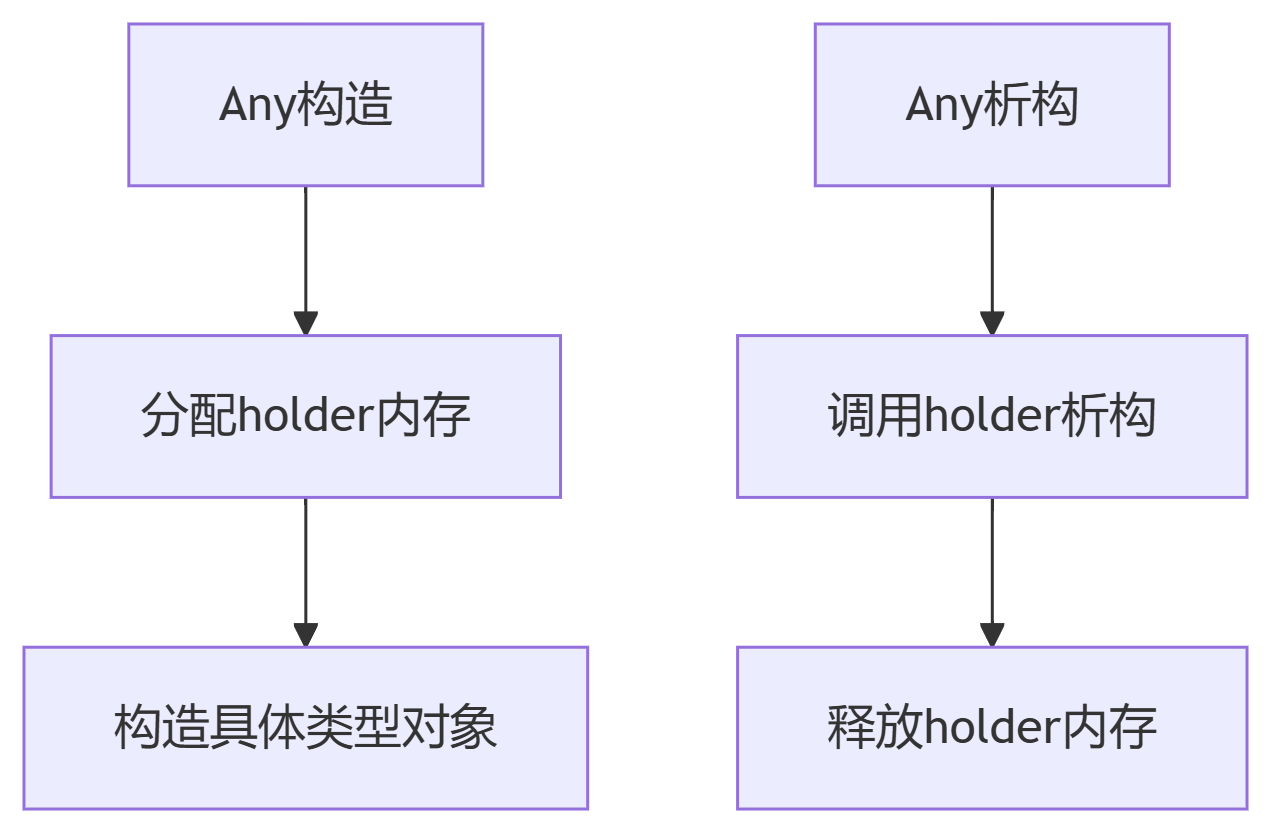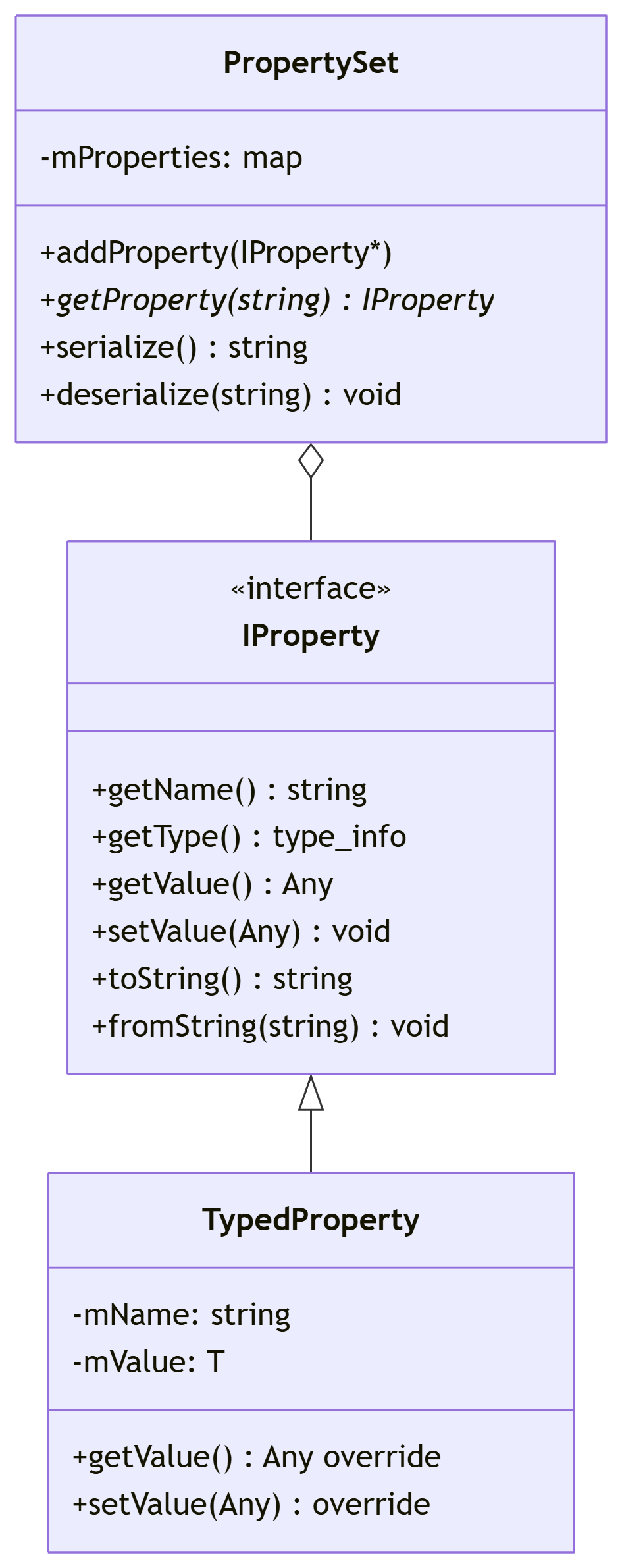深入解析游戏引擎(OGRE引擎)通用属性系统:基于Any类的类型安全动态属性设计 - 指南
引言:游戏引擎中的动态属性挑战
在游戏引擎开发中,我们经常面临处理多种数据类型的挑战:从简单的整数、浮点数到复杂的向量、颜色和自定义结构。传统C++的静态类型系统虽然安全高效,但难以满足游戏引擎对动态属性系统的需求。OGRE引擎通过其创新的Any类解决了这一难题,实现了类型安全的动态属性容器。
本文将深入剖析OGRE的Any实现,展示如何基于它构建强大的通用属性系统,支持从基础类型到复杂结构的各种属性。
一、Any类深度解析:类型安全的动态容器
1.1 核心设计思想:类型擦除模式
class Any {
class placeholder {
public:
virtual ~placeholder() {}
virtual const std::type_info& getType() const = 0;
virtual placeholder* clone() const = 0;
};
template
class holder : public placeholder {
ValueType held;
};
placeholder* mContent;
};类型擦除技术:通过基类虚函数接口隐藏具体类型信息
多态存储:holder模板类保存具体类型值
运行时类型识别:通过type_info实现运行时类型查询
1.2 内存管理机制

显式内存管理:new/delete直接控制内存分配
深拷贝支持:clone()方法实现复制语义
异常安全:使用swap技巧保证赋值操作的异常安全
1.3 跨平台类型比较
inline bool type_info_equal(const std::type_info& t0, const std::type_info& t1) {
#if defined(WIN32) || defined(__ANDROID__)
return t0 == t1;
#else
return strcmp(t0.name(), t1.name()) == 0;
#endif
}Windows/Android平台:直接比较type_info对象
其他平台:通过类型名称字符串比较
解决兼容性问题:确保跨平台行为一致性
二、通用属性系统设计
2.1 属性系统架构

2.2 属性基类实现
class IProperty {
public:
virtual ~IProperty() = default;
virtual const std::string& getName() const = 0;
virtual const std::type_info& getType() const = 0;
virtual Any getValue() const = 0;
virtual void setValue(const Any& value) = 0;
virtual std::string toString() const = 0;
virtual bool fromString(const std::string& str) = 0;
// 属性元数据
virtual bool isReadOnly() const { return false; }
virtual bool isAnimatable() const { return true; }
};2.3 模板属性实现
template
class TypedProperty : public IProperty {
public:
TypedProperty(const std::string& name, const T& defaultValue)
: mName(name), mValue(defaultValue) {}
const std::type_info& getType() const override {
return typeid(T);
}
Any getValue() const override {
return Any(mValue);
}
void setValue(const Any& value) override {
if (type_info_equal(value.getType(), typeid(T))) {
mValue = *any_cast(&value);
} else {
throw std::bad_cast();
}
}
std::string toString() const override {
std::ostringstream oss;
oss > mValue).fail();
}
private:
std::string mName;
T mValue;
};三、多样化属性类型实现
3.1 色彩属性(支持多种格式)
class ColorProperty : public IProperty {
public:
enum Format { RGB, RGBA };
ColorProperty(const std::string& name, const Vector4& defaultValue, Format fmt = RGBA)
: mName(name), mValue(defaultValue), mFormat(fmt) {}
void setFormat(Format fmt) { mFormat = fmt; }
Any getValue() const override {
if (mFormat == RGB) {
return Any(Vector3(mValue.x, mValue.y, mValue.z));
}
return Any(mValue);
}
std::string toString() const override {
std::ostringstream oss;
if (mFormat == RGB) {
oss << mValue.x << "," << mValue.y << "," << mValue.z;
} else {
oss << mValue.x << "," << mValue.y << "," << mValue.z << "," << mValue.w;
}
return oss.str();
}
// ... 其他方法实现
};3.2 向量属性(支持2D/3D/4D)
template
class VectorProperty : public TypedProperty> {
public:
using VectorType = Vector;
VectorProperty(const std::string& name, const VectorType& defaultValue)
: TypedProperty(name, defaultValue) {}
std::string toString() const override {
std::ostringstream oss;
const auto& vec = this->getValueRef();
for (int i = 0; i 0) oss > vec[i])) return false;
if (i > comma) && comma != ',') return false;
}
this->setValue(vec);
return true;
}
};3.3 枚举属性(下拉选择框)
class EnumProperty : public IProperty {
public:
EnumProperty(const std::string& name,
const std::vector& options,
int defaultValue = 0)
: mName(name), mOptions(options), mIndex(defaultValue)
{
if (mIndex = static_cast(mOptions.size())) {
mIndex = 0;
}
}
const std::type_info& getType() const override {
return typeid(int);
}
Any getValue() const override {
return Any(mIndex);
}
void setValue(const Any& value) override {
if (auto index = any_cast(&value)) {
if (*index >= 0 && *index (mOptions.size())) {
mIndex = *index;
}
}
}
std::string toString() const override {
return mOptions[mIndex];
}
bool fromString(const std::string& str) override {
auto it = std::find(mOptions.begin(), mOptions.end(), str);
if (it != mOptions.end()) {
mIndex = static_cast(std::distance(mOptions.begin(), it));
return true;
}
return false;
}
const std::vector& getOptions() const {
return mOptions;
}
private:
std::string mName;
std::vector mOptions;
int mIndex;
};四、高级特性实现
4.1 属性变更通知系统
class ObservableProperty : public IProperty {
public:
using ChangeHandler = std::function;
void addChangeHandler(ChangeHandler handler) {
mHandlers.push_back(handler);
}
void setValue(const Any& value) override {
Any oldValue = getValue();
// 实际设置值...
if (mImpl) {
mImpl->setValue(value);
}
// 通知所有监听器
for (auto& handler : mHandlers) {
handler(this, oldValue);
}
}
private:
std::unique_ptr mImpl;
std::vector mHandlers;
};4.2 属性序列化与反序列化
class PropertySet {
public:
std::string serialize() const {
JSON json;
for (const auto& [name, prop] : mProperties) {
json[name] = {
{"type", prop->getType().name()},
{"value", prop->toString()}
};
}
return json.dump();
}
void deserialize(const std::string& data) {
JSON json = JSON::parse(data);
for (auto& [key, value] : json.items()) {
if (auto prop = getProperty(key)) {
std::string typeName = value["type"];
if (typeName == prop->getType().name()) {
prop->fromString(value["value"]);
}
}
}
}
private:
std::unordered_map> mProperties;
};4.3 属性编辑器集成
class PropertyEditor {
public:
void createUI(IProperty* prop) {
const std::type_info& type = prop->getType();
if (type == typeid(int)) {
createIntEditor(prop);
} else if (type == typeid(float)) {
createFloatEditor(prop);
} else if (type == typeid(Vector3)) {
createVector3Editor(prop);
} else if (type == typeid(Color)) {
createColorEditor(prop);
} else if (dynamic_cast(prop)) {
createEnumEditor(static_cast(prop));
}
// ... 其他类型支持
}
void createColorEditor(IProperty* prop) {
// 创建颜色选择器UI组件
auto colorPicker = new ColorPicker();
colorPicker->setColor(any_cast(prop->getValue()));
// 绑定双向数据流
connect(colorPicker, &ColorPicker::colorChanged, [prop](const Color& c) {
prop->setValue(Any(c));
});
prop->addChangeHandler([colorPicker](const IProperty*, const Any& value) {
colorPicker->setColor(any_cast(value));
});
}
};五、性能优化策略
5.1 小对象优化
class Any {
union {
placeholder* mContent;
char mBuffer[16]; // 小对象缓冲区
};
bool mIsSmall;
template
void construct(const T& value) {
if (sizeof(holder) (value);
mIsSmall = true;
} else {
mContent = new holder(value);
mIsSmall = false;
}
}
~Any() {
if (mIsSmall) {
reinterpret_cast(mBuffer)->~placeholder();
} else {
delete mContent;
}
}
};5.2 类型转换优化
template
T* any_cast_fast(Any* any) {
if constexpr (std::is_fundamental_v) {
// 基本类型直接内存访问
return reinterpret_cast(&any->mBuffer);
} else {
return static_cast*>(any->mContent)->held;
}
}5.3 属性访问缓存
class PropertySet {
public:
template
T& get(const std::string& name) {
auto it = mCache.find(name);
if (it != mCache.end()) {
return *static_cast(it->second);
}
IProperty* prop = getProperty(name);
T* value = any_cast_fast(&prop->getValue());
mCache[name] = value;
return *value;
}
private:
std::unordered_map mCache;
};六、实际应用案例
6.1 材质系统属性
class Material {
public:
void initProperties() {
mProperties.addProperty(
new ColorProperty("diffuse", Color(1.0f, 1.0f, 1.0f)));
mProperties.addProperty(
new FloatProperty("roughness", 0.5f, 0.0f, 1.0f));
mProperties.addProperty(
new EnumProperty("blend_mode",
{"Opaque", "Alpha Blend", "Additive"}));
}
void applyToGPU() {
auto& diffuse = mProperties.get("diffuse");
auto roughness = mProperties.get("roughness");
auto blendMode = mProperties.get("blend_mode");
// 设置GPU状态...
}
private:
PropertySet mProperties;
};6.2 游戏对象组件系统
class GameObject {
public:
void addComponent(const std::string& name, IComponent* comp) {
mComponents[name] = comp;
// 自动暴露组件属性
for (auto& prop : comp->getProperties()) {
mProperties.addProperty(prop->getName() + "." + name, prop);
}
}
template
T* getComponent(const std::string& name) {
return dynamic_cast(mComponents[name]);
}
PropertySet& getProperties() {
return mProperties;
}
private:
std::unordered_map mComponents;
PropertySet mProperties;
};七、与传统方案的对比
| 方案 | 类型安全 | 性能 | 灵活性 | 易用性 |
|---|---|---|---|---|
| 硬编码属性 | 高 | 高 | 低 | 中 |
| 联合体(union) | 低 | 高 | 低 | 低 |
| void*指针 | 无 | 高 | 高 | 低 |
| OGRE Any方案 | 高 | 中 | 极高 | 高 |
OGRE Any方案优势:
类型安全:运行时类型检查防止错误访问
扩展性强:支持任意用户定义类型
统一接口:所有属性使用相同API操作
反射支持:为序列化、编辑提供基础
生命周期管理:自动内存管理
结论:构建现代游戏引擎的基石
OGRE的Any类为游戏引擎属性系统提供了强大的基础设施。通过本文的深入分析,我们展示了如何基于Any构建完整的属性系统:
核心容器:实现类型安全的动态值存储
属性抽象:统一接口处理各种数据类型
类型扩展:支持色彩、向量、枚举等游戏专用类型
高级特性:变更通知、序列化、编辑器集成
性能优化:小对象存储、快速访问路径、缓存机制
这种设计模式已成为现代游戏引擎的标准架构,广泛应用于:
Unity的SerializedObject系统
Unreal Engine的UProperty系统
Godot的Variant和Property系统
掌握基于Any的属性系统设计,不仅能够提升游戏引擎开发效率,还能为工具链开发、数据驱动架构奠定坚实基础。





 浙公网安备 33010602011771号
浙公网安备 33010602011771号